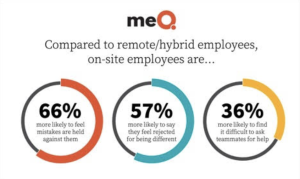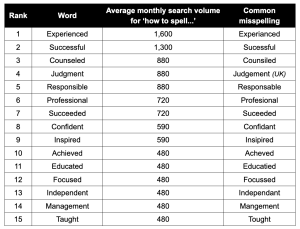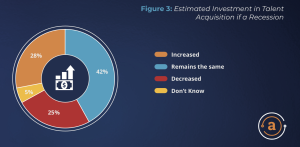Here at TLNT we receive – almost on a daily basis – an inbox-filling amount of emails containing findings from the latest pieces of HR-related research.
They cover everything from incidences of quiet-quitting to analysis of the impacts of different management styles, to predicted unemployment levels and everything in-between.
But, to be honest, a lot of the stuff we read is fairly run-of-the-mill – with the data containing deductions that are – for want of a better phrase – ‘largely to be expected’.
One the most recent releases we received was from Myers-Briggs, promoting research which concluded that the more time individuals spent dealing with conflict at work, the lower their job satisfaction and the less included they felt. You don’t say!
But, every now and then, we get sent the results of some new investigations that seem to go against the grain.
In fact, far from being expected, they present findings that are a bit more surprising. They contain observations that we think HR professionals might find useful in weighing up their decision-making.
So, as part of sorting the wheat from the chaff, we’ve decided to pull together some of the most recent unusual/unexpected findings of research we’ve been sent:
1) Remote workers report ‘higher’ psychological safety

It’s become accepted in HR circles that far from enjoying the freedoms that remote working brings them, those who predominantly work away from the office tend to have higher levels of loneliness and depression and crave more personal interaction. It’s this reality, analysts claim, that is driving more people back to the office at ever-faster rates. So it’s significant, perhaps, that a new study by meQuilibrium suggests that when it comes to psychological safety, remote and hybrid employees have more of it than at-office employees. This seems to be counter to what we might have expected. But the differences continue. It also finds on-site employees are 66% more likely to feel like mistakes are held against them; that they are 57% more likely to say that people are rejected for being different; and are 36% more likely to find it difficult to ask teammates for help. In theory, this shouldn’t be case, as one would expect all those things to be more acute for remote workers. So what’s going on? “In many remote-for-the-first-time environments where everybody is the same size square on the video call, it’s often easier to speak up and be heard,” suggests Brad Smith, PhD, and chief science officer at meQuilibrium. He adds: “As employers continue to consider how best to structure the workplace, leaders will need to address this very real gap in psychological safety across work settings in order to ensure that innovation, creativity and change-readiness is not compromised in the return to on-site work.”
2) The most commonly misspelled words on resumes

Perhaps you’ve already noticed some of these howlers on CVs you’ve received already. But language learning company, Preply, has come up with a list of the most troubling words for job seekers. It analyzed Google searches on ‘how to spell’ the 150 most popular US words job hunters use in their CVs. It found the word ‘experienced’ is the word job seekers most commonly have trouble spelling, followed by ‘successful’ and ‘counseled’.
3) Talent acquisition tech spend is rocketing – don’t get left behind

It’s easy to blame a tightening economy and a suspicion that everyone else is battening-down the hatches as an excuse for cutting back spend on HR technology. After all, if everyone else is counting the pennies, why should I continue to spend with alacrity? But It might be worth bearing in mind new findings from Modern Hire. Its latest ‘The Evolution of Talent Acquisition Technology’ report questioned more than 300 senior level talent acquisition and HR professionals, and found spend on talent acquisition (TA) software is not slowing down. In fact it’s anything but. It suggests 73% of companies increased their TA tech investment in 2022, while 70% of companies plan to continue to invest the same amount in TA tech, even during an economic downturn. At least 28% plan to increase their investment. It argues this technology is now seen to be even more essential during a downturn, to enable companies to find the scarce talent they will need. It also finds that more than 60% of companies are using more TA tech solutions today than before Covid-19. Says report author Madeline Laurano: “Companies are looking at technology to support every area of recruitment, from recruitment marketing to onboarding.” She adds: “We have moved past the early fears of AI and employers, recruiters, and candidates are embracing AI-driven solutions. One in two companies believe that AI will improve the candidate experience. Companies must carefully consider the role that AI plays in transforming the TA tech stack and which providers take an ethical approach to AI.”
4) Neurodiversity – what’s that?

If you take it for granted that your peers or fellow leaders understand what you mean when you talk about neurodiveristy, then you might want to take notice of recent research from Texthelp. It finds a staggering 91% of businesses surveyed lacked awareness of how common neurodiversity is – with only 5% of neurotypical respondents being aware that one-in-five people are neurodivergent. It also found that only 28% of HR professionals said they are ‘very confident’ about being able to identify different types of conditions that are considered as neurodivergent. Almost one in ten (9%) admitted they were ‘not at all’ confident. Maybe it’s time to start spreading the word internally that people have different needs.
5) The least stressful remote working jobs
Want to know which of jobs are the least stressful if done remotely? FlexJobs recently number-crunched them, and has created a definitive list (do any of your roles feature?). Using the O*Net database, run by the U.S. Department of Labor, it first looked at which jobs required ‘stress tolerance’ – defined as how much a given job “requires accepting criticism and dealing calmly and effectively with high-stress situations.” (Jobs are then rated from 0 to 100). Jobs with higher ratings are more stressful and require more stress tolerance from the people doing them.
FlexJobs then compared the hundreds of jobs with lower stress levels (less than 80) on O*Net’s list to its own database to compile a list of jobs that are lower-stress, and which are also marked as having a bright outlook (expected to grow rapidly in the next several years). Here they are below, with their respective stress rating next to them:
- Environmental Science and Protection Technicians, Including Health (58)
- Search Marketing Strategists (58)
- Operations Research Analysts (61)
- Bioinformatics Technicians (63)
- Business Intelligence Analysts (63)
- Epidemiologists (64)
- Biostatisticians (64)
- Economists (64)
- Statisticians (64)
- Dietitians and Nutritionists (65)
- Tutors (65)
- Computer and Information Research Scientists (66)
- Philosophy and Religion Teachers, Postsecondary (68)
- Financial Examiners (69)
- Art Directors (69)
- Technical Writers (69)
- Weighers, Measurers, Checkers, and Samplers, Recordkeeping (70)
- Actuaries (70)
- Medical Scientists, Except Epidemiologists (71)
- Foresters (71)
- Bookkeeping, Accounting, and Auditing Clerks (71)
- Market Research Analysts and Marketing Specialists (72)
- Paralegals and Legal Assistants (72)
- Clinical Data Managers (73)
- Information Security Analysts (73)
- Broadcast Technicians (74)
- Photographers (74)
- Web Developers (74)
- Logistics Analysts (75)
- Validation Engineers (75)
- Marketing Managers (75)
- Secretaries and Administrative Assistants, Except Legal, Medical, and Executive (75)
- Software Quality Assurance Analysts and Testers (75)
- Special Effects Artists and Animators (75)
- Training and Development Specialists (75)
- Genetic Counselors (76)
- Customer Service Representatives (77)
- Interpreters and Translators (77)
- Talent Directors (77)
- Law Teachers, Postsecondary (78)
- Accountants and Auditors (78)
- Engineering Teachers, Postsecondary (78)
- Fundraisers (78)
- Speech-Language Pathologists (78)
- Industrial Engineers (79)
- Computer and Information Systems Managers (79)
- Video Game Designers (79)
- Health Specialties Teachers, Postsecondary (80)
- Fine Artists, Including Painters, Sculptors, and Illustrators (80)
- Coaches and Scouts (80)
- Training and Development Managers (80)
